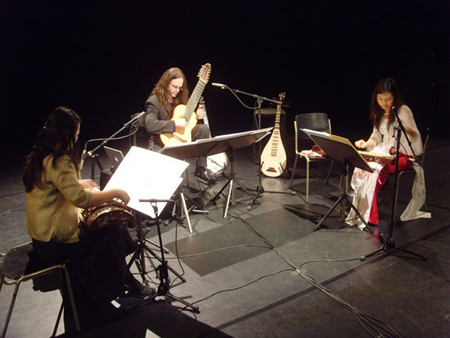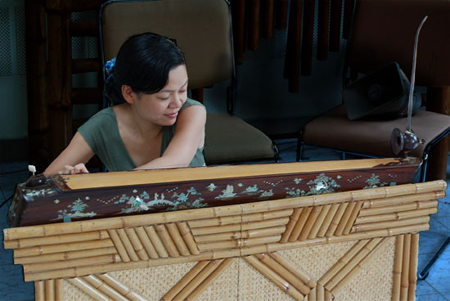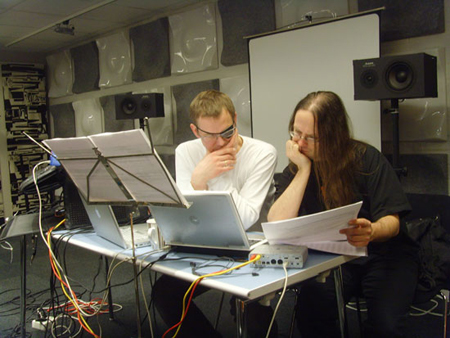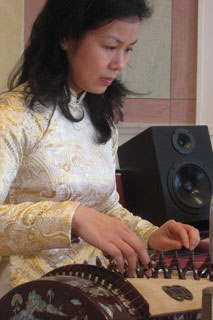
Published for The Neotrope Enterprise. Publisher: Bengt Rooke. June. 2009. No. 61.
The Six Tones is a Swedish/Vietnamese project that, since 2006, works on a long-term basis on the amalgamation of art music from Vietnam and Europe. The Six Tones are, Nguyen Thanh Thuy (who plays dan tranh) and Ngo Tra My (who play dan bau), two Vietnamese performers, and the Swedish guitarist Stefan Östersjö (also playing many other stringed instruments).
The name of the group, emanating from a piece by Henrik Frisk, relates to the fact that the Vietnamese language is a tonal language using six tones or intonations. Our main point of departure has been to create a foundation for a meeting between two distinct musical cultures on equal terms. This practice implies the questioning of what is ”centre” and what is ”periphery”: is the Western art music the norm (centre) and the traditional Vietnamese music an exotic ”other”? Still, long after the world had been found to rotate around the sun, in the mind of a Westerner, the world continued to be centred round Europe. In music, we find a parallel in the conception of differences of a hierarchic nature between notated and orally transmitted music. What can our distinct musical cultures learn from each other? How can the Western art music adopt a listening role? How can an essentially orally transmitted culture turn the encounter with experimental music into a tool for renewal? A means to create these meetings is to allow new works to emerge from joint improvisations, that bit-by-bit approach a more defined form. The notation is neither the end result nor a single normative force in the artistic process, but the work instead takes shape as a continual negotiation between several parties.
About the music.
The work on his piece was the starting point for the entire project and took place in open forms in April 2006. Video: The Six Tones Part 1:
Part 2: A performance of Henrik Frisk’s The Six Tones at Atalante,
Nam Ai (Southern sorrow) is a traditional Vietnamese piece in the Tai Tu style of Southern Vietnam. We approach this music with the intention of incorporating the 10-string guitar with the traditional playing techniques and sound worlds of the Vietnamese instruments. A performance of Nam Ai at Atalante in Gothenburg,
Nguyen Thien Dao has had a key function in the merging between Western art music and Vietnamese music. He was born in Hanoi but came to France at the age of thirteen. Ten years later he commenced his studies at the Conservatoire National Supérieur de Musique de Paris where he studied composition with Olivier Messiaen. After having become established as an important figure in French music he began to make contact with the emerging music life in Vietnam in the 1990’ with the premiere of several orchestral works.
In 2004 he worked with Nguyen Thanh Thuy on a new piece for dan tranh as part of the process of writing a series of works for traditional Vietnamese instruments. The result of this work was the solo for dan tranh called Khoi Song (2005). Video: Khoi Song: A performance by Nguyen Thanh Thuy of Nguyen
Henrik Denerins mnemoneuei deals with memory. Memory as recollection, as trace; memory that reviews – memory that repeats. Video: Denerin: A performance of Henrik Denerin’s mnemoneuei He Moi is a traditional Vietnamese piece in the tradition of the Cheo drama. This music depicts one of the important stereotypical characters in the drama, the clown, and is performed here in a version for dan tranh and 10-string guitar. Video: He Moi: A performance of He Moi by Nguyen Thanh Thuy
Love Mangs Viken is originally a piece for guitar, banjo and electronics. The composer started out his work, not by writing music but by writing a haiku-poem which served as a metaphorical lantern for the piece. Initially, the composer wanted to derive the musical structure from the poems, but eventually the music took its own course. Viken is not program music but draws impulses and general characteristics from these texts. The transcription for trio was made by The Six Tones without the composer’s participation. Viken (The Bay) Echo of the ripples
Video: Viken Part 1:
Part 2:
Malin Bångs composition Fireworks and Silver Birds is a piece for trio and electronics. This is how the composer describes the joint work in improvisations and workshops that starting in autumn 2007 led to her piece: ”The group improvised on different types of movement as themes, which generated both gesture with a lot of friction and contrasting light, volatile parts. The musical content of the work emerged out of these meetings, and from influences from the traditional Vietnamese musical form ca tru.The text to the ca tru that I chose as point of departure is a symbolic ode to peace, with a hope for a constructive development of the country and a new strong community..” Video: "Fireworks and Silver Birds" Part 1:
A performance of Malin Bång’s Fireworks and Silver Birds
Tu Dai Oán is a piece in the Tai Tu tradition of Southern Vietnam. Video: Tu Dai Oán: A performance of Tu Dai Oán with The Six Tones at
Atalante,
Edward Said reminds us of the political nature of all cultural activity. In the spirit of Said we wish to underline that The Six Tones is in essence a political statement and a project that is in no way neutral to Kiplings classical imperialistic assertion that ”east is east and west is west”. Of course they meet. The question is only under which conditions and with what intentions.
More recordings from our latest tour in March and April in Sweden and Denmark can be heard at www.myspace.com/thesixtones
The tour was organized in collaboration between Concerts Sweden, RANK, Malmö Academy of Music and SIDA.
© 2009 Stefan Östersjö and Rooke Time
Stefan Östersjö
|
|
|




